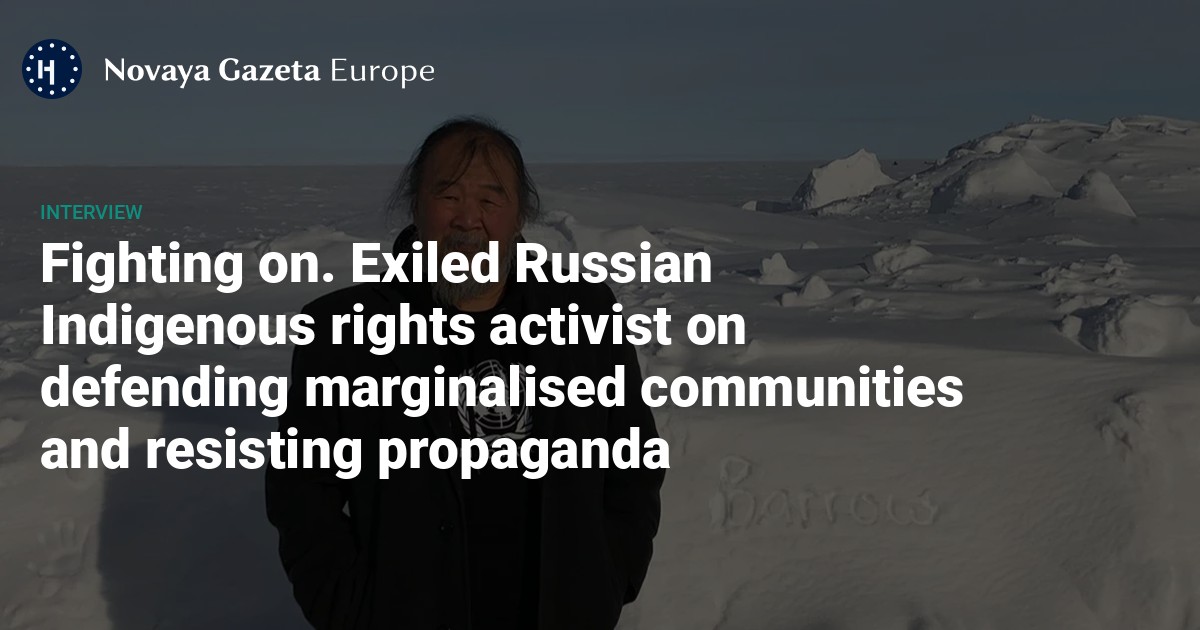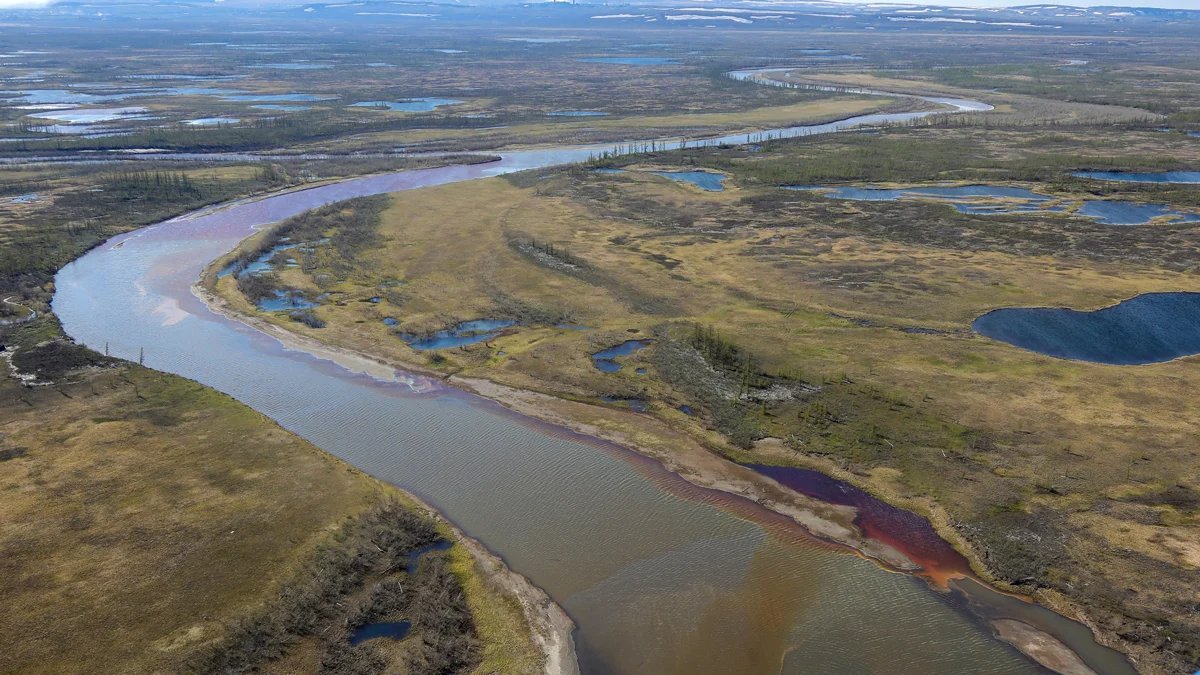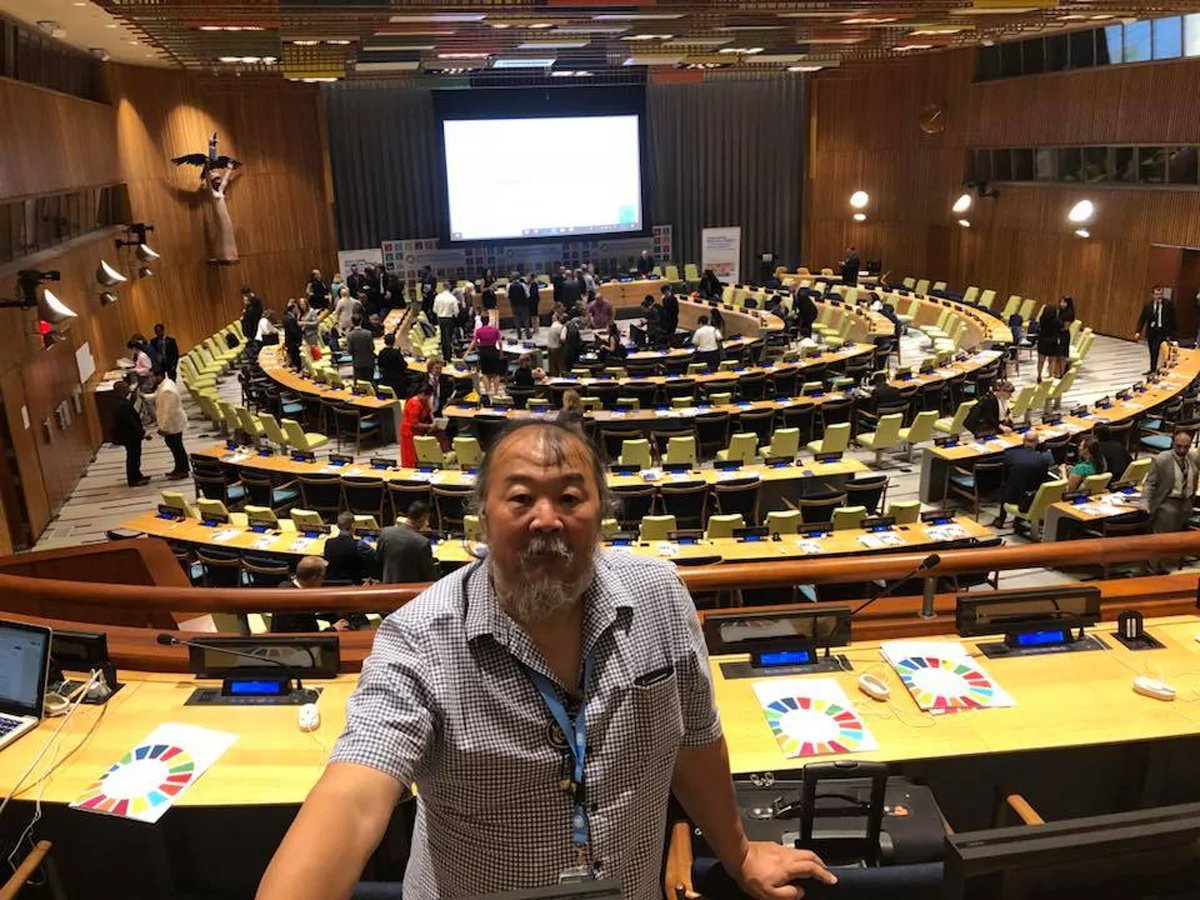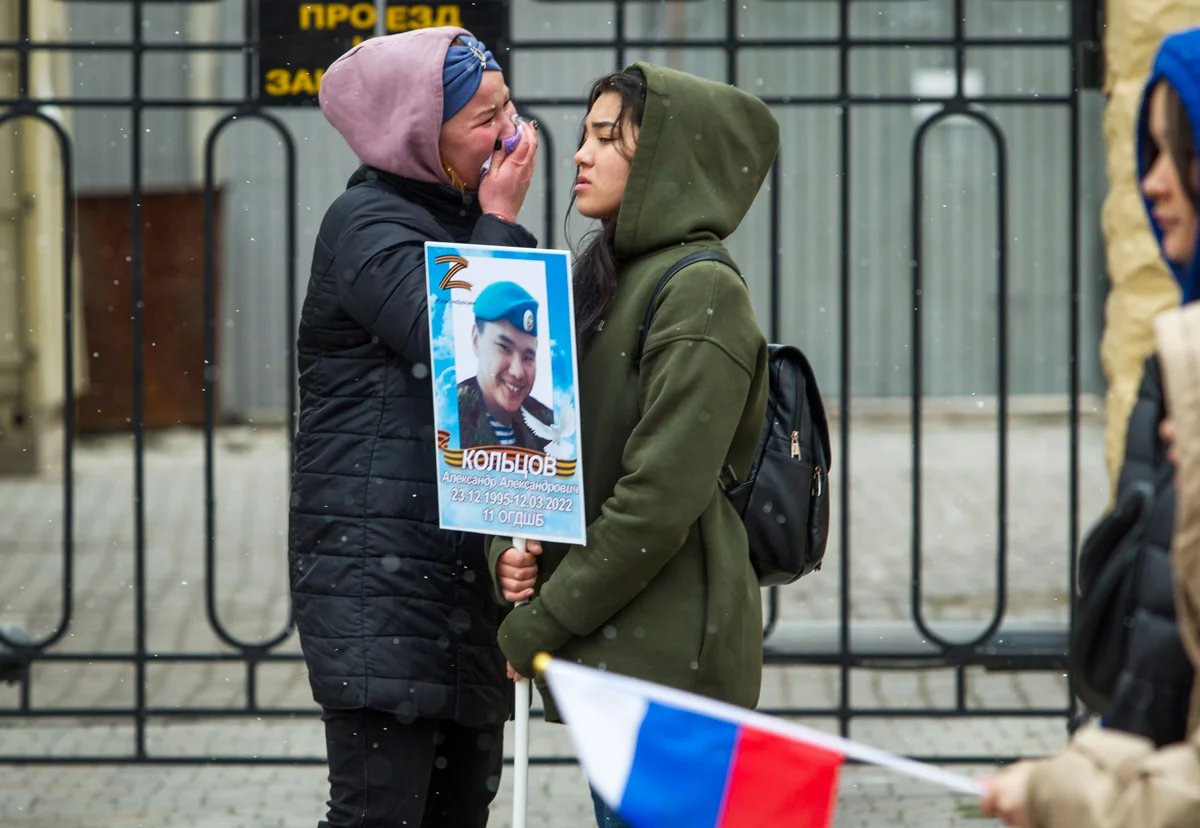



On 14 May, the Russian Prosecutor General’s Office declared Batani, the International Indigenous Fund for Development and Solidarity, a long-time advocate for Indigenous peoples of the Russian North, Siberia and Far East, an “undesirable organisation”, essentially criminalising its activity in Russia.
The prosecutors accused Batani of engaging in “anti-Russian rhetoric at international events” and “regularly publishing materials alleging violations of minority ethnic groups in Russia” on its website, namely in the context of Russia’s ongoing war in Ukraine.
Batani has long been a thorn in the side of the Russian authorities. It was founded over two decades ago by Pavel Sulyandziga, a prominent Indigenous rights defender and an ethnic Udege, a people native to Russia’s Far East.
Sulyandziga, who was forced to flee Russia for the US in 2016 after coming under pressure from the security services, continues his work in exile.
“The Russian government has always tried to isolate Indigenous issues and the issues of democratic change in general.”
In a conversation with Novaya Gazeta Europe, he reflects on why he continues to support Indigenous communities — even those who have been affected by pro-war propaganda — and why the Kremlin fears organisations like his.
NGE: How did you react to Batani being declared “undesirable”?
PS: Without much emotion, frankly. In the current climate, any organisation not aligned with the regime can expect the same. We were labelled a “foreign agent” years ago. Now it’s “undesirable”. I saw it coming.
NGE: Do you think it’s linked to your recent joint declaration with members of the Russian opposition?
PS: Yes, I believe it played a role. The Russian government has always tried to isolate Indigenous issues and the issues of democratic change in general. They like to pretend these are separate concerns. But history shows that real change requires unity among all opponents of the regime. That kind of unity frightens the authorities.
NGE: What is Batani working on now?
PS: We have several initiatives. Some we can’t speak about openly due to safety concerns in Russia.
One major focus is resisting exploitation of Indigenous lands by corporations under the guise of the “green economy”. After the catastrophic 2020 oil spill in Taymyr — when a Norilsk Nickel fuel tank burst — local communities turned to us after being ignored by the company and government.
“These stories — people criminalised for traditions like hunting and fishing — are endless.”
We launched a global campaign asking Elon Musk not to buy nickel from Norilsk. At the time, Tesla was seeking new suppliers. Our campaign reached international companies and human rights organisations, German and Swiss banks, investors, and eventually Tesla itself. As a result, Swiss banks divested. Tesla pulled out.
After that, Norilsk began to engage with us. We had difficult meetings. It felt like we were speaking different languages, but a dialogue started. That changed with the full-scale invasion of Ukraine, when talks were frozen.
Out of this grew the SIRGE Coalition, a global Indigenous alliance confronting exploitative green industries. I chair its steering committee, which includes representatives from 16 Indigenous nations worldwide. We work with the EU, UN bodies, and legislators on resource extraction policy affecting Indigenous territories.

View of oil spill near Norilsk, 2020. Photo: Krasnoyarsk region government
NGE: What kind of violations do communities report to you?
PS: Many relate to fishing and hunting rights. Rivers are privatised, quotas cut. Locals fish on ancestral land and are called poachers. One man was convicted for poaching for hunting moose on allocated grounds. … From prison, he was conscripted, and died at the front in December 2024.
These stories — people criminalised for traditions like hunting and fishing — are endless.
Years ago, Russia repealed Indigenous rights to free, indefinite land use. I was against it at the time, but I was told: “What are you complaining about? We want to pass a law that would grant Indigenous communities the right to hunt and fish anywhere, in any quantity, at any time.” Many bought it: some did not want to read the fine print, while others thought it was fruitless to fight the authorities. But lands were soon auctioned off, and communities lost. Now those who continue hunting and fishing on their land, which in reality no longer belongs to them, are labelled poachers.
“For almost three years, we lived in limbo — no work permit, no savings. We survived on humanitarian aid.”
NGE: You left Russia for the US in 2016. When and why did you decide to leave?
PS: I held on for as long as I could — in 2016, I even agreed to run for parliament with the [liberal opposition party] Yabloko.
But I had faced threats for years before I was forced to leave. I had uncovered the looting of Dylacha, an Evenk community in Buryatia, exposing the involvement of local FSB officers and government officials — and, as I later learned, [Sergey] Chemezov [an oligarch and ally of Putin]. I brought the case to the UN’s Committee on the Elimination of Racial Discrimination and hosted UN officials in Buryatia, which was reported in the media.
In retaliation, the community was destroyed. Business was restructured. The prosecutor was promoted. One security officer told me flat out: “You ruined Chemezov’s plan to make Putin’s daughter the jade queen. You’ll be buried.”
I also wrote about Russia’s new serfdom for Indigenous people: men from cities would show papers claiming they owned land and resources, telling villagers: “I won’t evict you — but everything here is mine.” I talked about this at the Congress of Peoples of Russia and at the UN.

Pavel Sulyandziga. Photo: Facebook
NGE: Why did you choose the United States?
PS: I hadn’t planned to emigrate. But when I was in trouble, an old neighbour — a fellow Udege living in the US — reached out. When I told her about the threats, she and her husband invited our family to stay.
Adapting was tough, but we did it. For almost three years, we lived in limbo — no work permit, no savings. We survived on humanitarian aid. That same neighbour got us food support from a local church. I tutored maths and chess privately to earn a little. I’m a certified chess instructor.
“There are cases of men fleeing into the taiga to avoid conscription.”
NGE: Do you work with universities now?
PS: Yes, though I’m not formally employed. I work as a researcher — I give lectures, hold events, publish academic articles.
There are bizarre rumours about me — that I fly helicopters, have vast riches. Recently, a fellow Russian exile told me he’d heard I stole millions. Then he saw my family living in a modest trailer and said: “Now I don’t believe the propaganda anymore.”
NGE: In 2022, you spoke about the mobilisation of Indigenous men for the war in Ukraine. Has the situation changed?
PS: Sadly, it’s only gotten worse. Many from my community have died. The army still targets villages. Police get locals drunk, then trick them into signing contracts while intoxicated. … There are cases of men fleeing into the taiga to avoid conscription. Some now face criminal charges for draft evasion. But people are starting to question things. They write to me more often, talking about the war with frustration.
But the influence of propaganda is still strong. One woman from my village called in tears. Her son wanted to volunteer for the front. She begged me to talk him out of it.

Women cry as they hold a photograph of a serviceman killed in Ukraine, Ulan-Ude, Russia, 9 May 2022. Photo: AP Photo / Scanpix / LETA
NGE: Does it upset you that many Indigenous people are subject to propaganda and support the current government?
PS: It’s not so much disappointment as sorrow. It’s not just Indigenous communities. Many Russians live in denial, their minds saturated with propaganda. Critical thinking is absent. They drift through life with no agency.
Yes, some sincerely believe they’re defending their homeland. But most go because they see no alternative. Russian society is steeped in apathy — even towards their own lives and the fate of their loved ones.
NGE: Do you have a clear idea of who the people you are helping are?
PS: I’m from a small Indigenous community myself. I know that within these communities, a battle of ideas is raging. Right now, the liars, careerists, and thieves are winning. That’s who the young see, and think this is a path to success. But there are still decent people — with no resources, no voice. They tell us: “Even if you abandon us, we will keep fighting.”
“In international law, it is peoples, not states, that hold sovereignty. That’s the very first line of the UN Charter.”
NGE: Why is the state so aggressive toward Indigenous rights organisations?
PS: Because it understands their significance — perhaps better than some in the opposition.
In international law, it is peoples, not states, that hold sovereignty. That’s the very first line of the UN Charter: “We the peoples...” And peoples have the right to self-determination.
Civilised countries engage seriously with Indigenous communities. That’s why it’s such a sensitive issue for the Russian authorities. They are trying to destroy all sprouts of Indigenous resistance, any attempt to have a different opinion.
When I worked within the UN system, I met with Russian diplomats, scientists, and experts. I can tell that they all understood it, because all those people are involved in the development of the architecture of international law.
On the other hand, I see that the Russian opposition often ignores the issues of Indigenous peoples, perhaps thinking that they are such small peoples that they are not visible at all. I think that this attitude comes from ignorance and misunderstanding.
The Russian government has banned independent media. We were forced to leave our country in order to keep doing our job, telling our readers about what is going on Russia, Ukraine and Europe.
We will continue fighting against warfare and dictatorship. We believe that freedom of speech is the most efficient antidote against tyranny. Support us financially to help us fight for peace and freedom.
By clicking the Support button, you agree to the processing of your personal data.
To cancel a regular donation, please write to [email protected]
VPNovaya
Help Russians and Belarusians Access the Truth
